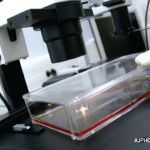Physicians often prescribe prednisolone and other glucocorticoids (GCs) despite the fact that these antiinflammatory drugs are known to have a negative effect on glucose metabolism. Thus, there is a need for an effective GC that delivers a better safety profile. Unfortunately, efforts to evaluate the side effect of impaired glucose metabolism are hampered by a limited ability to quantify insulin resistance in animal trials. In particular, researchers have found it difficult to measure GC-induced insulin resistance in mice.
Erik J. M. Toonen, PhD, a postdoctoral fellow at the Radboud University Nijmegen Medical Centre in The Netherlands, and colleagues addressed this research gap by publishing an integrative model of drug-induced metabolic dysregulation in the September issue of PLoS ONE.1 They describe an accurate whole-body glucose test that is effective in a chronic collagen-induced arthritis (CIA) mouse model. The all-in-one model is designed to be useful for studying both the efficacy of novel GC compounds in the treatment of arthritis and the effects of novel GC compounds on glucose kinetics.
The team focused their investigation on prednisolone. They first documented prednisolone as an effective treatment for CIA, then compared prednisolone with placebo, as well as to a non-GC anti-inflammatory compound called ORG 37663. Inclusion of ORG 37663 in the study allowed the investigators to distinguish between direct and indirect drug effects on metabolism. Thus, the investigators were able to assess if the reduction of insulin sensitivity seen with prednisolone was specific to GC or was a downstream effect of the suppression of inflammation. The investigators found that treatment of arthritic and non-arthritic mice with prednisolone or ORG 37663 resulted in reduced thymus weight. As expected, arthritic mice had decreased arthritic score and X-ray scored upon treatment with either prednisolone or ORG 37663.
The investigators then compared the glucose metabolism of mice with and without arthritis. They first confirmed that their blood glucose kinetics test did not influence the development of arthritis. Once this was established, they used the assay to reveal that there was no difference in blood glucose concentrations between arthritic and non-arthritic mice before treatment. They did find, however, that the metabolic clearance rate (MCR) glucose parameter was increased in untreated arthritic mice vs. untreated non-arthritic mice. In addition, endogenous glucose production (EGP) in untreated arthritic mice was significantly higher than in the untreated non-arthritic mice. After three weeks of treatment with placebo, arthritic mice had lower plasma C-peptide concentrations than did placebo-treated non-arthritic mice. Placebo-treated arthritic mice were also 2.4 times more insulin sensitive than placebo-treated non-arthritic mice.
The researchers next turned their attention to treatment-induced metabolic dysfunction. They used the glucose kinetics test to assess arthritis-induced, prednisolone-induced and ORG 37663-induced metabolic dysfunction. The investigators found that prednisolone treatment significantly reduced insulin sensitivity in both non-arthritic and arthritic mice. Although ORG 37633 also lowered blood glucose concentrations in arthritic mice, the effect was slight when compared with placebo treatment. Treatment with prednisolone or ORG 37663 resulted in a decrease in C peptide concentrations in both arthritic and non-arthritic mice. The investigators note that although mice treated with prednisolone did develop insulin resistance, they did not experience hyperglycemia, suggesting that the mice have a highly adaptive compensatory mechanism.
In their conclusion, the authors write, “we successfully integrated the whole body glucose test in the CIA mice model, which enabled us to measure both efficacy and metabolic (adverse) effects of (experimental) GCs in a chronic in vivo inflammatory setting. Thereby, it may prove a useful translational model for compound-induced metabolic derangements in patients suffering from RA [rheumatoid arthritis] or other (auto) immune diseases. This study showed that both inflammation and glucocorticoids affect insulin secretion and sensitivity but this did not lead immediately to the development of hyperglycemia and type 2 diabetes mellitus.”(posted 10/31/14)
Lara C. Pullen, PhD, is a medical writer based in the Chicago area.
Reference

